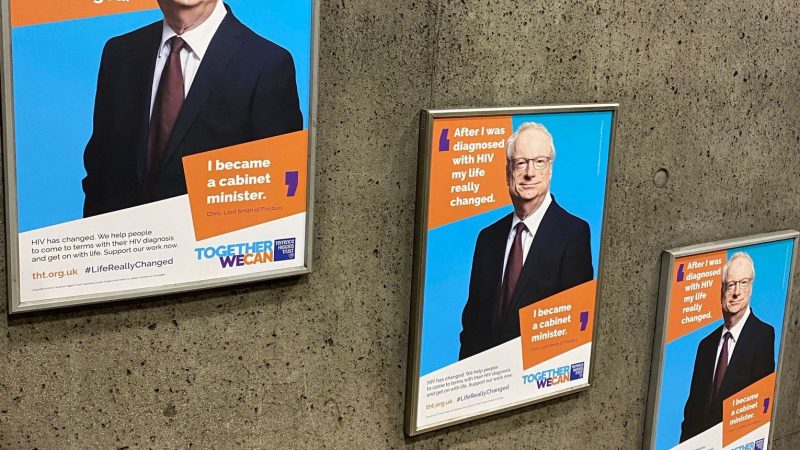
A former Labour MP and cabinet minister has become one of the faces of a new health campaign by the Terrence Higgins Trust to show that a HIV diagnosis does not have to stop people from fulfilling their dreams or career goals.
Politicians returning to Westminster today after the summer recess were greeted by posters depicting Lord Chris Smith, a cabinet minister under the last Labour government and the first openly HIV positive MP.
The posters – which read “after I was diagnosed with HIV, my life really changed… I became a cabinet minister” – are part of a campaign using the real stories of Smith and 12 others to show how much progress has been made in the treatment of HIV.
Lord Smith was elected to the House of Commons in 1983. He was later diagnosed with HIV in the 1980s, at the height of the AIDS crisis. He became the Culture, Media and Sport Secretary in 1997 and first spoke publicly about his diagnosis in 2005, the same year in which he stood down from the Commons and was created a life peer.
He has since been joined by Lloyd Russell Moyle. The Labour MP for Brighton, Kemptown, elected in 2017, used an adjournment debate on HIV and World AIDS day in 2018 to reveal his HIV diagnosis.
“Lord Smith’s life since his HIV diagnosis is what our new campaign is all about,” Terrence Higgins Trust chief executive Ian Green said. Green is also HIV positive and features on the campaign posters.
“When we decided to do it, we knew we wanted Lord Smith’s inspiring story to be included. I hope that people see the campaign and learn about how much HIV has changed since the 1980s.
“I was diagnosed with HIV in 1996 and told I would have around six to eight years to live – that was 25 years ago. Now I take one pill a day, will live as long as anyone else and know I can’t pass on HIV to my husband Paul.”
Around 30 people are still diagnosed with HIV every week in London. Mayor Sadiq Khan pledged last week to use TfL advertisement space on trains and buses to promote HIV testing to Londoners.
Green highlighted that the government committed to ending new HIV cases by the end of the decade. He described this as “achievable” because of the measures available for prevention, testing and treatment.
But he warned that the 2030 target will require a “step change”, saying that MPs must ensure that the forthcoming HIV action plan from the government must be “worthy of its name in terms of its ambition and its funding”.
The trust is calling for op-out HIV testing across healthcare providers, where blood is taken, to help find the estimated 7,000 people in the UK living with undiagnosed HIV.
It is also urging the government to make HIV prevention pill pre-exposure prophylaxis (PrEP) available beyond sexual health clinics, at GP surgeries and pharmacies for example.
Green added: “I hope that MPs look up and smile – but also feel motivated to act. HIV has changed, but we need concerted actions from government to finish the job and end new HIV cases by 2030 – something that would have seemed unthinkable just a decade ago. But we’re absolute clear: we can do it and we must.”
The most recent estimates, from 2019, suggested that there were 105,200 people living with HIV in the UK. Of these, around 6,600 are undiagnosed. London has the highest rates of HIV in the country. 36% of new diagnoses and 38% of people seen for HIV care in 2019 were in London.
Anyone can get HIV but people from some groups or some parts of the world are more likely to be affected. Men who have sex with men and Black African people are disproportionately affected.
4,139 people diagnosed with HIV in the UK in 2019. Of those, 41% were gay or bisexual men. Of the 1,559 heterosexual people diagnosed with HIV in 2019, 37% were Black African men and women.
The mortality rate for people aged 15-59 who were diagnosed early in 2017 was for the first time equal to that of the general population for the same age group.




More from LabourList
‘It’s one year since I became Britain’s youngest MP. Here’s what I’ve achieved so far’
Tribute: ‘David Lipsey’s joie de vivre is missing in Labour politics today’
Ellie Reeves: ‘One year in, the next phase begins – focused on living standards’